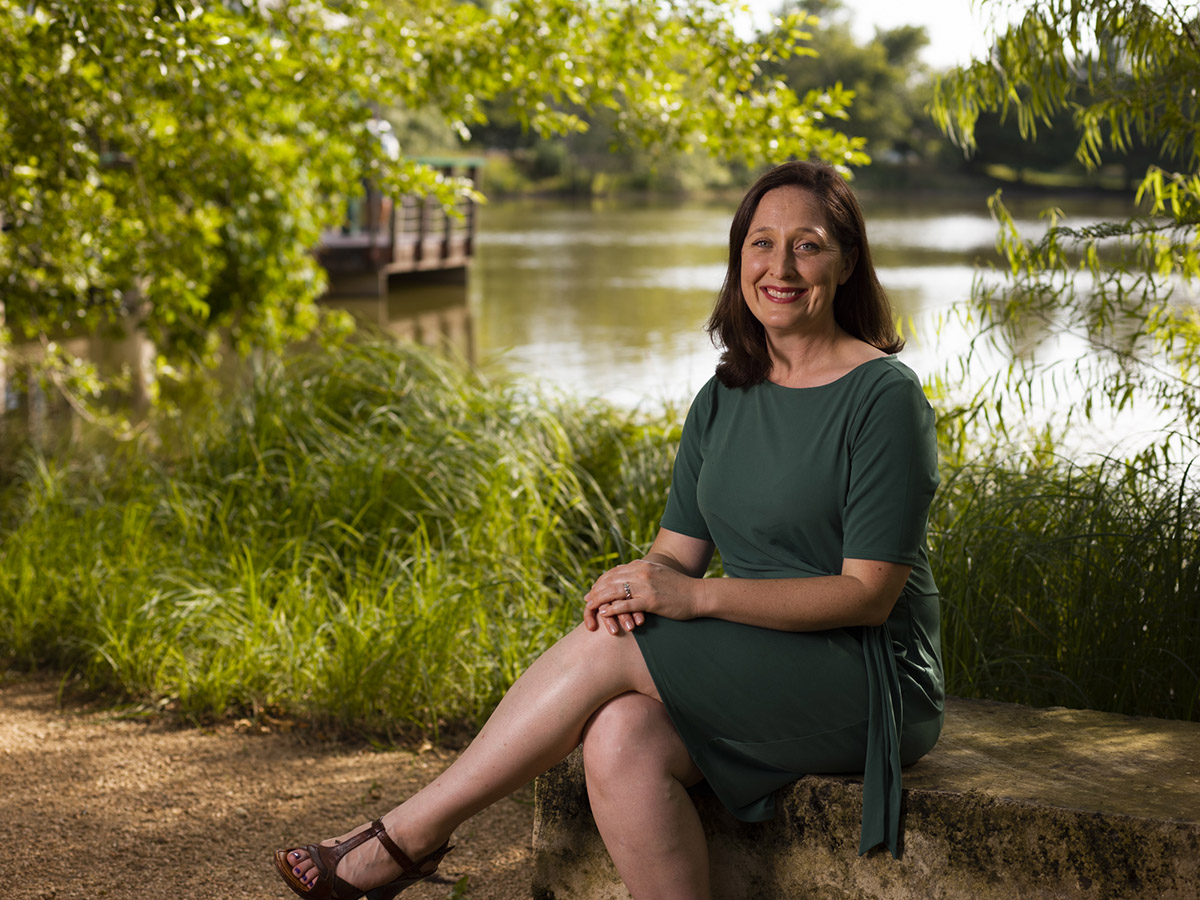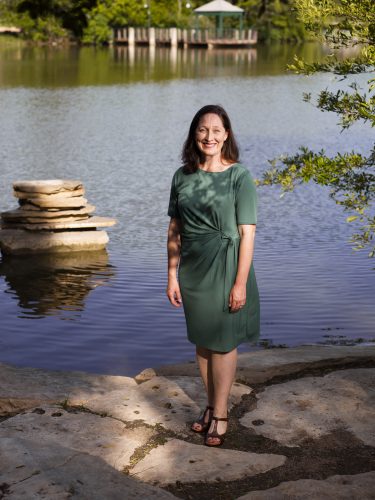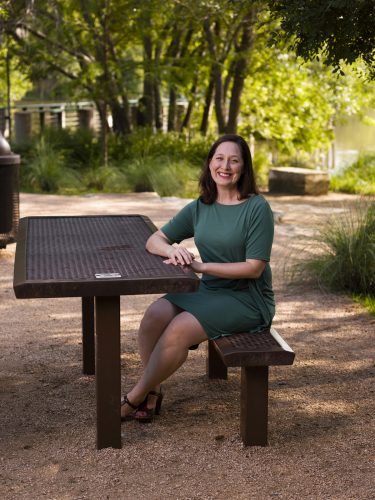English Degree Equals Opportunity Across the Globe
Jennifer Klein used her command of language as a consultant for the World Bank and a children’s advocate.

Jennifer Klein is a consultant in charge of data quality at the World Bank. Photo by Matthew Johnson
English Degree Equals Opportunity Across the Globe
Jennifer Klein used her command of language as a consultant for the World Bank and a children’s advocate.
Hailing from Henrietta, Texas, Jennifer Klein ’01 majored in English because she loved reading and writing — and she hadn’t been exposed to many career paths in her tiny hometown.
Henrietta is “not the kind of place where you see a lot of people in professional careers,” she said. “My mom was a teacher, and my dad fixed oil wells and raised cattle. I didn’t really know too much about what people did with college degrees other than teaching, so I just picked something I knew I would be good at and assumed it would all work out.”
Klein’s safe bet opened doors to opportunities across the globe. Her command of language, writing and analysis led to international teaching posts, a prestigious graduate school program, consulting work with the World Bank and advocacy for children in foster care.
Beyond Books
“Without a doubt, the most valuable learning experience for me at TCU was studying abroad,” said Klein, who spent two undergraduate semesters in London.

Jennifer Klein spent two undergraduate semesters in London. She said studying abroad was the most valuable experience she gained at TCU. Photo by Matthew Johnson
“Jennifer is an exceptional example of the power of study abroad on our students,” said Susan Layne, a study-abroad adviser who retired in June after 32 years at TCU. “She went from small-town Texan to a fearless world traveler.”
Klein’s tale isn’t unusual for alumni, said Tracy Rundstrom Williams ’96, associate director of TCU’s Center for International Studies. “Students may come from a place of limited exposure and awareness of the rest of the world, then study abroad and find their curiosity piqued and their confidence blossom.”
TCU’s liberal arts courses help develop students’ inquisitiveness as well as critical thinking and research writing skills, Williams added. “They teach students to think about the world and global issues in nuanced, complex, nontraditional ways. This prepares students to take part in international experiences with an open mind and curiosity.”
From Fort Worth to the World
By graduation, Klein had a general plan of doing “something international.” She took a short-term position with Fort Worth Sister Cities International guiding a summer high school leadership program.
While working there, she met students and teachers from Fort Worth sister city Toluca, Mexico, who recommended her for a teaching post at their school. She moved to Mexico to teach American literature and business English.
Klein next taught English in Nagaoka, Japan, another Fort Worth sister city. On her vacation days, she said, she “did a whole lot of traveling: China, Vietnam, Cambodia, Thailand, Indonesia, Malaysia and within Japan.”
Her extensive travels opened her eyes to the plight of children who were working instead of attending school. “In Cambodia, I was outside the temples of Angkor Wat, and all these kids were swarming us speaking lots of different languages trying to sell things to the tourists. They were brilliant and fearless. I started thinking about how bright Cambodia’s future would be if these kids were able to get the education they need,” she said.
Wanting to transform awareness into action, Klein enrolled in Georgetown University’s graduate program for international affairs. She graduated with a Master of Science in Foreign Service in 2006.
The Language of Data
Klein started working at the World Bank on a project collecting information on the organization’s efforts to improve education in the developing world.
“I’ve often thought that it’s truly strange that a girl who did an English degree ended up working with so much data.”
Jennifer Klein
World Bank work segued into a grant-writing position with the Guinea office of the International Rescue Committee, a global humanitarian aid, relief and development organization. “Grant writing is a really good option for English majors that I wish someone would have told me about,” Klein said, explaining how she wrote detailed reports to donors to show how funds were being used to help refugees and the Guinean communities near refugee camps.
In Guinea, Klein met her husband, George Burrows IV, a Marine stationed at the U.S. Embassy in Conakry.
She also reconnected with the World Bank, which asked her to update the education report from the prior year. “That’s how I got started doing work remotely for them back in 2007, and I’ve been doing that kind of work ever since.”
Founded in 1944 and based in Washington, D.C., the World Bank provides loans and grants to low- and middle-income countries. Klein still updates her annual education report. She also researches, crunches and communicates data so the average reader can understand it.

Jennifer Klein uses her degree to humanize data and advocate for children and education. Photo by Matthew Johnson
She has written about educational management systems in Caribbean countries to explain how governments compile data on students, teachers and schools. She studies data on educators in conflict zones to help governments and other organizations manage teachers in fragile contexts. More recently, she has been researching the World Bank’s role in supporting higher education.
“Most of my work is related to data: data quality, database management, data analysis, data visualization, coordination with data partners,” she said. “I’ve often thought that it’s truly strange that a girl who did an English degree ended up working with so much data.”
A Future in Advocacy
After working as a “digital nomad” and traveling around the world with her husband, Klein returned to the U.S. and settled in Austin, Texas, in 2015.
While she continues work with the World Bank, she kindled another passion in June 2018 when she became a foster parent. For almost a year, she said, much of her writing involved lengthy reports to the Texas Department of Family and Protective Services and the children’s legal representatives, documenting their struggles and advocating for what the kids needed to heal from their trauma.
She and her husband adopted a 12-year-old boy in May. After that experience, Klein said, advocating for children in the foster system might become a career focus.
“I still have a lot of interest in international issues with children, but after dealing with the foster care system, I think there’s definitely a need for someone who can be a strong voice supporting foster parents and kids in foster care by giving people in power information on where the system is failing.”

Your comments are welcome
Comments
Related reading:
Alumni, Features
Making a Difference Through Medical Nonprofits
Four alumni physicians have a heart for healing and work to make the world a better place — one patient at a time.
Alumni
Ron Hall’s True Calling
An art dealer’s story of friendship takes on a life of its own as a movie, Same Kind of Different As Me, now in theaters.
Features
Service-Learning Program Connects Students with Community
Engagement outside the classroom goes beyond volunteering to shape the student experience.